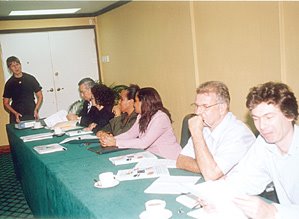EU stresses good governance in assisting
developing countries
By Chamanlall Naipaul
 THE European Union (EU), set to become the largest aid donor to Guyana, is placing increased emphasis on good governance as a benchmark in providing aid to developing countries.
THE European Union (EU), set to become the largest aid donor to Guyana, is placing increased emphasis on good governance as a benchmark in providing aid to developing countries. At a workshop yesterday at Cara Lodge, Quamina Street, in Georgetown, to refine a country strategy to use financial aid under the 10th European Development Fund (EDF), Economic Adviser to the Delegation of the EU here, Ms. Ritva Sallmen, said the European Commission (EC) will place much emphasis on good governance during the next programming period by rewarding well-performing countries with additional funding through an incentive tranche.
Additional funds will also be set aside for unforeseeable purposes such as natural disasters.
Sallmen indicated that the emphasis on good governance is because of the recognition that any good track record in development can be traced back to the quality of governance, adding that countries with three tiers of state power ---executive, justice, and parliament --- and with strong institutions and code of conduct within and between these institutions, are respected as they demonstrate a “good return on money invested in development.”
However, acknowledging that the total aid package earmarked for Guyana over the next five years amounts to some US$1 billion when support from the Inter-American Development Bank (IDB), World Bank, Department For International Development (DFID), Canadian International Development Agency (CIDA), United States Agency for International Development (USAID), among others, is taken into account, Sallmen asked whether Guyana would have the capacity to absorb such a huge volume of aid.
She contended that despite massive injection of financial aid, Guyana continues to show a weak Gross Domestic Product (GDP), and high level of poverty, and is characterised by ad hoc policy decisions.
Sallmen further observed that the growth of the private sector has been sluggish with low levels of foreign direct investment and a high rate of unemployment.
Development cooperation between Guyana and the EC began under the successive Lome Conventions and continues under the Cotonou Agreement through the EDFs and National Indicative Programme (NIP) and other financial modalities.
Under Lome I from 1975 to 1980, Guyana benefited from 16.7 million Euros, while corresponding figures for Lome II (1980-1985), Lome III (1985-1990) and Lome IV (1990-1995) were 57.4M Euros, 31.9M Euros, 73.9M Euros. For the 8th EDF under Lome IVb (1995-2000) 60.4M Euros were received, while under the 9th EDF,38.9M Euros were committed.
Guyana also benefits from regional agreements such as EC/CARICOM and CARIFORUM agreements, the development for Caribbean rum, the HIV/AIDS Medi–Lab, support for rice sector competitiveness and trade, as well as assistance for disaster preparedness.
In addition, Guyana is participating in the establishment of an Economic Partnership Agreement (EPA) between CARICOM and the EC. Under this agreement, support for the Ogle Airport project on the East Coast Demerara is anticipated.
The purpose of the workshop was to fine-tune the EC’s country strategy and the contents of the NIP, and participants drawn from governmental agencies and trade unions discussed different options including continued support for the sea defences of Guyana, macroeconomic support in the implementation of the Poverty Reduction Strategy, opportunities for interventions in governance, and in land use.
Copyright GNNL June 2006









